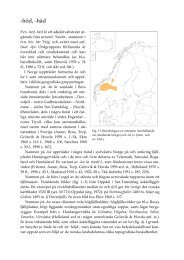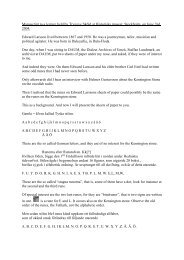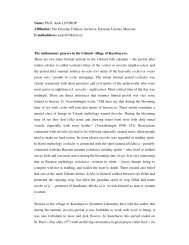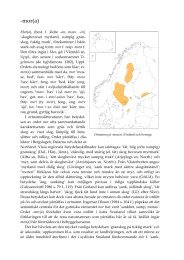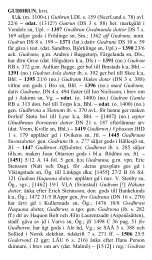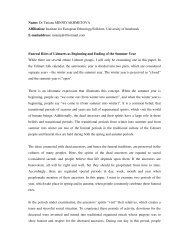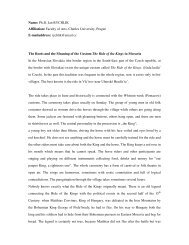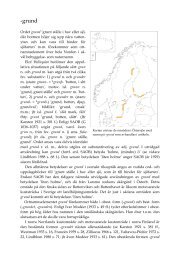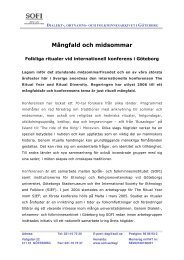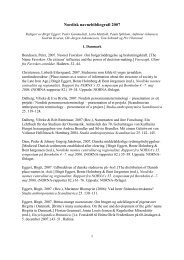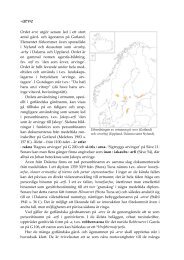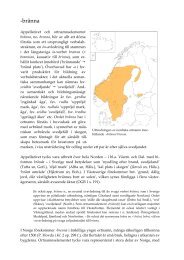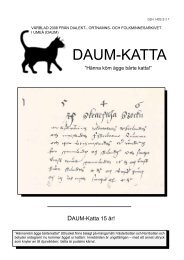Name: Dr Giovanni Orlando MURACA Affiliation: Università degli ...
Name: Dr Giovanni Orlando MURACA Affiliation: Università degli ...
Name: Dr Giovanni Orlando MURACA Affiliation: Università degli ...
- No tags were found...
You also want an ePaper? Increase the reach of your titles
YUMPU automatically turns print PDFs into web optimized ePapers that Google loves.
<strong>Name</strong>: <strong>Dr</strong> <strong>Giovanni</strong> <strong>Orlando</strong> <strong>MURACA</strong><strong>Affiliation</strong>: Università <strong>degli</strong> Studi della Calabria, Centro interdipartimentale didocumentazione, Demoantropologica “R. Lombardi Satriani”E-mailaddress: giomuraca@libero.itThe Pilgrimage of our Lady of PolsiTo this very day in the first years of the third millennium millions of people in the worldbreak their routine in order to immerse themselves in a spiritual experience. They do all theycan to undertake arduous pilgrimages to visit saints, madonnas and divinities in holy places,to speak to them, to offer gifts, to ask for help and advice, for small and great miracles to beperformed, to feel protected and reassured.The pilgrimage in its time and space, with its rituals and symbols is thus one of the mosteffective ritual practices of repression of risk experienced by man.In Calabria this happens every year between September 1st to September 2nd when thousandsof pilgrims set out to venerate Our Lady of the Mountain in Polsi, a sixteenth century tufastatue made in Sicily.The sanctuary – situated in an old thirteenth century convent of basilian origins – is found inthe heart of Aspromonte, in a valley hollowed out at an altitude of 865 m. right on the eastside of Montalto (1955 m.), the highest peak of the National Park of Aspromonte.The sanctuary at Polsi represents a point of reference in the collective imagination of peoplesin the south of Italy, a token of faith to pay at least once in one’s lifetime. This holds not onlyfor the believer. Even unbelievers who come to Polsi feel as if they have set out beyond a“new frontier”.This happens not only because reaching Polsi has always represented challenging themountain, which rises in all its majesty and fascination, fraught with discomforts and dangers,but also because during the pilgrimage and feast one can still experience complex devotionalways and multiple rituals no longer forming part of other festive contexts of theMediterranean basin.
In Polsi very many elements dating back to the rites of the Magna Grecia culture can befound, the bases of which are still evident in the soul, language – older people, for example, inthe villages around the sanctuary still speak Greek, according to some, Homer’s Greek – andcustoms of the people of Calabria.Suffice it to say – until not very long ago – when the statue of Our Lady was taken out inprocession grain and flowers used to be thrown around it and this is certainly one of the manypagan residues of the old cult of Demetra and Persephone, a symbol of the link betweenhuman fertility and that of the earth; and what about bloody sacrifice of hundreds ofslaughtered goats near the sanctuary, the flesh of which is eaten, boiled or roasted, in anatmosphere reminiscent of the old “Greek cuisine of sacrifice” described by scholars such asDetienne and Vernant; or the rite of “incubatio” in the church or the offers to Our Lady –from the most varied of ex-votos to unbridled “tarantelle” which represent an ancient anduniversal way of honouring the divine being.Therefore pilgrims go to Polsi to pray, thank, ask for graces to be granted, but also to feelfree, live the illusion, be together, dance, sing and eat goat.During these last years, however, church authorities have required several substantial changesand which are being made in religious practices and traditional devotions, in an attempt tolevel and normalize all those manifestations of popular belief which is obviously upsetting.



